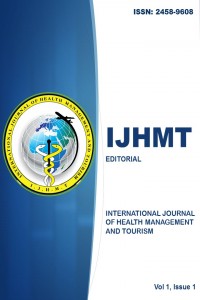Abstract
The aim of this study is based on investigating the link between health beliefs and health decision-making using the application of Health Belief Scale on Sportive Recreational Activities. The data have been collected from 190 volunteer students which study Sports and Theology at University of Batman and Gumushane. The data have been examined using by Independent Samples t-test and One way Anova. Student perceptions regarding “Perceived Severity have been high. Regarding “Psychosocial Benefits” and “Self-Efficacy” sub-factors, there is a significant difference (p<0,05) between perception levels of theology students and perception levels of sports students.
Keywords: Health beliefs, sportive recreation, university students, tourism, marketing.
References
- Arnocky, S., and Stroink, M. (2011). Variation in Environmentalism Among University Students: Majoring in Outdoor Recreation, Parks, and Tourism Predicts Environmental Concerns and Behaviors. The Journal of Environmental Education, 42(3), 137–151.
- Baić, M., Andrijašević, M., and Sporiš, G. (2013). Attitudes Towards Exercise And The Physical Exercise Habits Of University Of Zagreb Students. Journal Annales Kinesiologiae, 4(1), 57-70.
- Benson, H.(1975). The Relaxation Response. NewYork, NY: Morrow.
- Çubuk, M. (1981). Turizmin Dinlenme, Eğlenme ve Boş Zamanları Değerlendirme ile Bütünleşmesi, Yeniden Tanım Denemesi ve Turizm Planlamasında Sistemli Bir Yaklaşım, Doktora Tezi, Mimar Sinan Üniversitesi, Mimarlık Fakültesi, İstanbul.
- Erkan, N. (1995). Boş Zamanı Değerlendirme, 19 Mayıs Gençlik ve Spor Akademisi Ders Notları, Ankara.
- Ertüzün, Ezgi (2013). Kadınların Sportif Rekreasyonel Aktivitelere İlişkin Sağlık İnançları. Doktora Tezi, Gazi Üniversitesi Sağlık Bilimleri Enstitüsü.
- Glikson, Artur (1997). Recreational Land Use, The Ecological Basis of Planning, 17-35.
- Hacıoğlu N, Gökdeniz A, Dinç Y (2003). Boş Zaman ve Rekreasyon Kavramlarının Analizi. İçinde A. Gökdeniz, (Ed.). Boş Zaman ve RekreasyonYönetimi: Örnek Animasyon Uygulamaları. Ankara: Detay Yayıncılık.
- Hemingway, J.L. (1996). Emancipating leisure: The recovery the freedom in leisure. Journal of Leisure Research, 28(1), 27-43.
- Janz, K. N. and Becker H. M. (1984). “The Health Belief Model: A Decade Later”, Health Education Quarterly, Vol. 11(1): 1-47.
- Karaküçük, S.(2008). Rekreasyon, Boş Zamanları Değerlendirme, Gazi Kitapevi, Ankara.
- McCormick-Brown, K., (1999). Health Belief Model. In Jones and Barlett Publishing (Eds.) Health Belief Model. http://www.jblearning.com/samples/0763743836/chapter%204.pdf. [Accessed on June 2015]
- Orji, R.,Vasilleva, J., and Mandryk, R., (2012). Towards an Effective Health Interventions Design: An Extension of the Health Belief Model. Online Journal of Public Health Informatics, ISSN 1947-2579, http://ojphi.org, Vol.4, (3).
- Ramazanoğlu, F., Altungül, O. ve Özer, A. (2004). Sportif Açıdan Rekreasyon Etkinliklerinin Değerlendirilmesi, Doğu Anadolu Bölgesi Araştırmaları, 3(1).
- Rosenstock, M. I., Strecher, J. V. and Becker H. M. (1988). Social Learning Theory and the Health Belief Model, Health Education Quarterly, Vol. 15(2): 175-183.
- Serarslan, M. Zahit ve Müslüm Bakır (1988), “Turizm Pazarlamasında Sporun Yeri ve Türkiye Açısından Değerlemesi”, Pazarlama Dünyası, Mayıs Haziran: 2(9): p.28-30.
- Sutton, S. (2001), “Health Behavior: Psychosocial Theories”, In N. J. Smelser & B. Baltes (eds.), International Encyclopedia of the Social and Behavioral Sciences. 6499—6506.
- Tel M., Öcalan M., Yaman M. (2000). Taekwondocuların Bu Sporu Tercih Etme Nedenleri ve Sosyo-Ekonomik Durumları, Türkiye Sosyal Araştırmalar Dergisi, Vol.3(3).
- Zorba E., Bakır M. (2004) Serbest Zaman Kavramı. Sporda Sosyal Alanlar Seçme Konular 1 (Ed: Ramazanoğlu F.), p106, Bıçaklar Kitabevi, Ankara.
Abstract
References
- Arnocky, S., and Stroink, M. (2011). Variation in Environmentalism Among University Students: Majoring in Outdoor Recreation, Parks, and Tourism Predicts Environmental Concerns and Behaviors. The Journal of Environmental Education, 42(3), 137–151.
- Baić, M., Andrijašević, M., and Sporiš, G. (2013). Attitudes Towards Exercise And The Physical Exercise Habits Of University Of Zagreb Students. Journal Annales Kinesiologiae, 4(1), 57-70.
- Benson, H.(1975). The Relaxation Response. NewYork, NY: Morrow.
- Çubuk, M. (1981). Turizmin Dinlenme, Eğlenme ve Boş Zamanları Değerlendirme ile Bütünleşmesi, Yeniden Tanım Denemesi ve Turizm Planlamasında Sistemli Bir Yaklaşım, Doktora Tezi, Mimar Sinan Üniversitesi, Mimarlık Fakültesi, İstanbul.
- Erkan, N. (1995). Boş Zamanı Değerlendirme, 19 Mayıs Gençlik ve Spor Akademisi Ders Notları, Ankara.
- Ertüzün, Ezgi (2013). Kadınların Sportif Rekreasyonel Aktivitelere İlişkin Sağlık İnançları. Doktora Tezi, Gazi Üniversitesi Sağlık Bilimleri Enstitüsü.
- Glikson, Artur (1997). Recreational Land Use, The Ecological Basis of Planning, 17-35.
- Hacıoğlu N, Gökdeniz A, Dinç Y (2003). Boş Zaman ve Rekreasyon Kavramlarının Analizi. İçinde A. Gökdeniz, (Ed.). Boş Zaman ve RekreasyonYönetimi: Örnek Animasyon Uygulamaları. Ankara: Detay Yayıncılık.
- Hemingway, J.L. (1996). Emancipating leisure: The recovery the freedom in leisure. Journal of Leisure Research, 28(1), 27-43.
- Janz, K. N. and Becker H. M. (1984). “The Health Belief Model: A Decade Later”, Health Education Quarterly, Vol. 11(1): 1-47.
- Karaküçük, S.(2008). Rekreasyon, Boş Zamanları Değerlendirme, Gazi Kitapevi, Ankara.
- McCormick-Brown, K., (1999). Health Belief Model. In Jones and Barlett Publishing (Eds.) Health Belief Model. http://www.jblearning.com/samples/0763743836/chapter%204.pdf. [Accessed on June 2015]
- Orji, R.,Vasilleva, J., and Mandryk, R., (2012). Towards an Effective Health Interventions Design: An Extension of the Health Belief Model. Online Journal of Public Health Informatics, ISSN 1947-2579, http://ojphi.org, Vol.4, (3).
- Ramazanoğlu, F., Altungül, O. ve Özer, A. (2004). Sportif Açıdan Rekreasyon Etkinliklerinin Değerlendirilmesi, Doğu Anadolu Bölgesi Araştırmaları, 3(1).
- Rosenstock, M. I., Strecher, J. V. and Becker H. M. (1988). Social Learning Theory and the Health Belief Model, Health Education Quarterly, Vol. 15(2): 175-183.
- Serarslan, M. Zahit ve Müslüm Bakır (1988), “Turizm Pazarlamasında Sporun Yeri ve Türkiye Açısından Değerlemesi”, Pazarlama Dünyası, Mayıs Haziran: 2(9): p.28-30.
- Sutton, S. (2001), “Health Behavior: Psychosocial Theories”, In N. J. Smelser & B. Baltes (eds.), International Encyclopedia of the Social and Behavioral Sciences. 6499—6506.
- Tel M., Öcalan M., Yaman M. (2000). Taekwondocuların Bu Sporu Tercih Etme Nedenleri ve Sosyo-Ekonomik Durumları, Türkiye Sosyal Araştırmalar Dergisi, Vol.3(3).
- Zorba E., Bakır M. (2004) Serbest Zaman Kavramı. Sporda Sosyal Alanlar Seçme Konular 1 (Ed: Ramazanoğlu F.), p106, Bıçaklar Kitabevi, Ankara.
Details
| Journal Section | Articles |
|---|---|
| Authors | |
| Publication Date | February 1, 2016 |
| Submission Date | August 18, 2015 |
| Published in Issue | Year 2016 Volume: 1 Issue: 1 |

